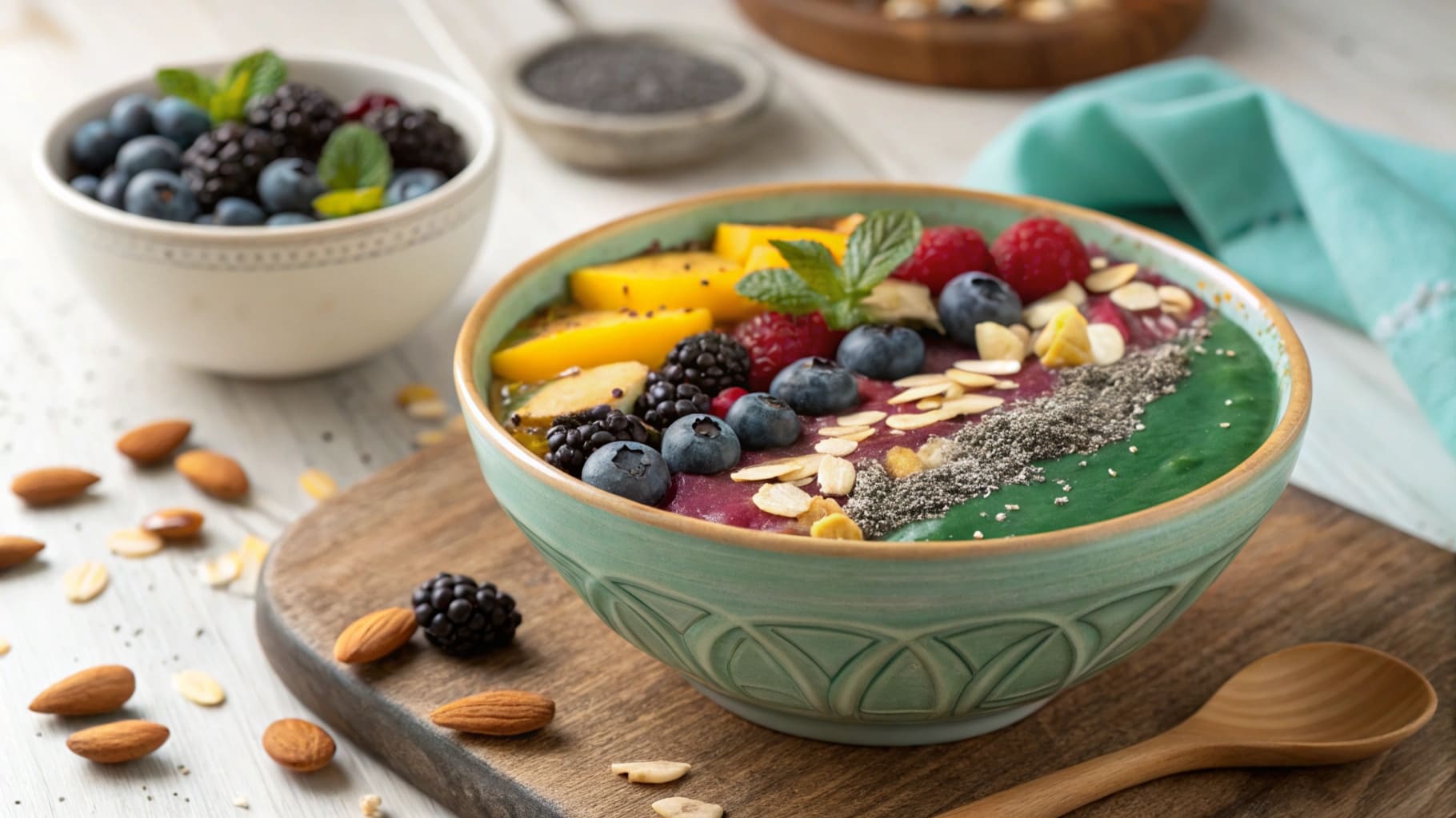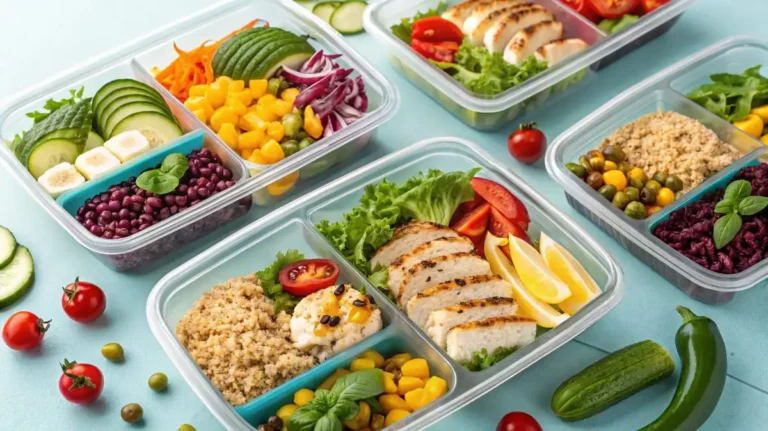Best 5 Nutrient Dense Smoothies to Boost Your Morning Energy
Do you often greet the morning feeling sluggish and lacking motivation? Are you stuck in a breakfast rut, longing for something more exciting and beneficial than your usual fare? If so, your search ends here! Nutrient dense smoothies are the ideal solution to flood your body with essential vitamins and minerals, jumpstarting your day with vibrant energy. These liquid powerhouses, brimming with vitamins, minerals, and antioxidants, offer a healthy and incredibly convenient way to fuel your body right from the moment you wake up.
This article will delve into the remarkable benefits of incorporating nutrient dense smoothies into your daily routine. We’ll introduce you to a spectrum of delicious and health-boosting recipes, and equip you with the knowledge to craft your own personalized nutrient dense smoothie creations.
Table of Contents
Why Choose Nutrient Dense Smoothies?
Nutrient dense smoothies are far more than just a tasty breakfast option; they are concentrated sources of vital nutrients, delivering a wealth of health advantages. Here’s why making them a regular part of your diet is a game-changer:
- Supercharge Your Immunity with Vitamin-Packed Smoothies: Nutrient dense smoothies are bursting with vitamins and potent antioxidants. These work synergistically to bolster your immune system, helping your body effectively fight off illness and maintain peak health throughout the year.
- Fuel Your Body Efficiently with Energy Smoothies: A well-crafted nutrient dense smoothie provides a quick yet sustained energy boost, perfectly tailored for busy individuals. These healthy breakfast smoothies offer the sustained energy you need to power through your morning without the crash.
- Support Digestive Health with Fiber-Rich Smoothies: The natural fiber and beneficial enzymes naturally present in fruits and vegetables within nutrient dense smoothies are fantastic for promoting healthy digestion. They contribute to a happy and balanced gut environment.
- Elevate Energy Levels Naturally with Power Smoothies: Unlike sugary breakfasts that lead to energy dips, nutrient dense smoothies provide a steady release of energy. This sustained boost keeps you feeling energized and focused throughout your day, supporting optimal productivity.
- Achieve Weight Management Goals with Healthy Smoothies: The high volume and naturally low-calorie density of nutrient dense smoothies are key for effective weight management. They promote a feeling of fullness and satisfaction, naturally curbing cravings for less healthy, calorie-dense foods.
- Enhance Skin and Hair Radiance with Antioxidant Smoothies: The potent antioxidants and essential vitamins found in nutrient dense smoothies are beauty boosters from within. They actively promote healthy skin cell regeneration and vibrant hair growth, leading to a naturally radiant appearance.
- Improve Mood and Well-being with Vitamin-Rich Smoothies: The natural sugars from fruits offer a gentle mood lift, while the comprehensive array of essential vitamins and minerals in nutrient dense smoothies play a crucial role in regulating mood and reducing stress, contributing to overall well-being.
Selecting the Right Ingredients for Your Nutrient Dense Smoothie
The secret to an exceptional nutrient dense smoothie lies in the thoughtful selection of high-quality ingredients. Here are key guidelines for creating a truly nutrient-packed and delicious smoothie:
- Fruits: Nature’s Sweetness and Vitamins: Incorporate a diverse range of fresh or frozen fruits to introduce natural sweetness and a broad spectrum of essential vitamins. Excellent choices include vitamin-rich berries, potassium-packed bananas, tropical mangoes, and citrusy oranges.
- Vegetables: The Nutritional Foundation of Healthy Smoothies: Don’t shy away from adding leafy greens like spinach, kale, or romaine lettuce. These are nutritional powerhouses that significantly enhance the overall nutritional value of your nutrient dense smoothie without overpowering the flavor.
- Protein: Building Blocks for Sustained Energy in Power Smoothies: Include a protein source such as protein powder (whey or plant-based), creamy Greek yogurt, nutritious seeds (like chia or flax), or nuts. Protein is crucial for promoting satiety, building and repairing tissues, and ensuring lasting energy throughout your day.
- Liquid Base: Hydration and Consistency in Healthy Smoothies: Choose water for a calorie-conscious option, dairy or plant-based milk for added creaminess and nutrients, or even refreshing coconut water. While fruit juice can be used, opt for whole fruit instead to maintain the “nutrient dense” focus and avoid added sugars.
- Superfoods: Amplify the Nutritional Value of Vitamin-Packed Smoothies: Elevate the nutritional profile of your nutrient dense smoothie by incorporating superfoods like chia seeds, flaxseed, spirulina, or maca powder. These ingredients provide an extra boost of vitamins, minerals, antioxidants, and healthy fats.
Delicious and Easy Nutrient Dense Smoothie Recipes
Here are some flavorful and simple nutrient dense smoothie recipes to get you started on your journey to healthier mornings:
1- The Green Machine Nutrient Dense Smoothie:
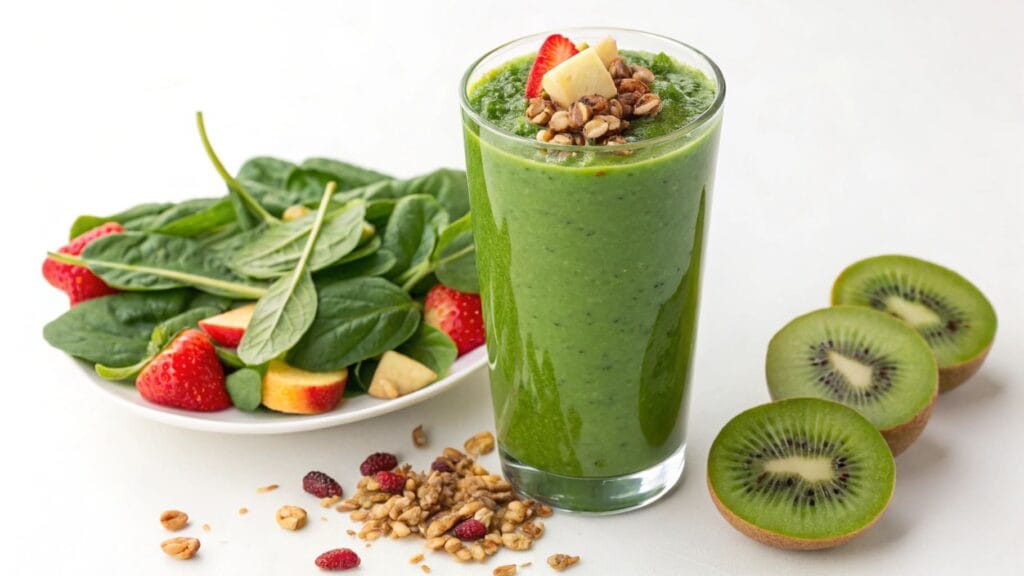
- 1 cup spinach
- 1 cup kale
- 1/2 cup frozen berries
- 1 banana
- 1/4 cup water
- 1 scoop protein powder (optional)
Instructions:
Combine all ingredients in a blender and blend until smooth.
2- Berry Blast Healthy Smoothie:
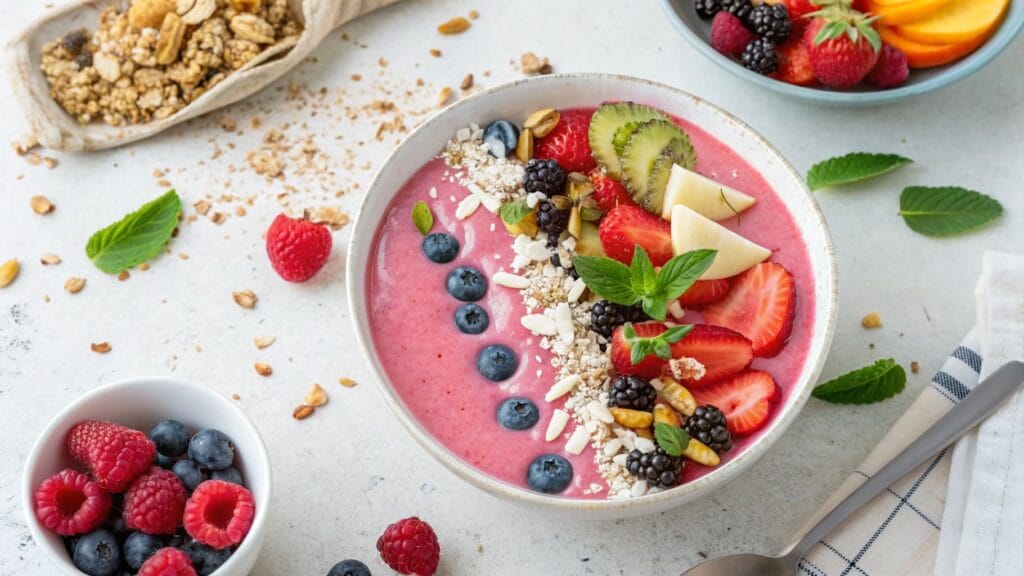
- 1 cup mixed berries (strawberries, blueberries, raspberries)
- 1/2 cup Greek yogurt
- 1/4 cup water
- 1 tablespoon chia seeds (optional)
- 1/4 teaspoon vanilla extract
Instructions:
Combine all ingredients in a blender and blend until smooth.
3- Tropical Tango Fresh Smoothie:
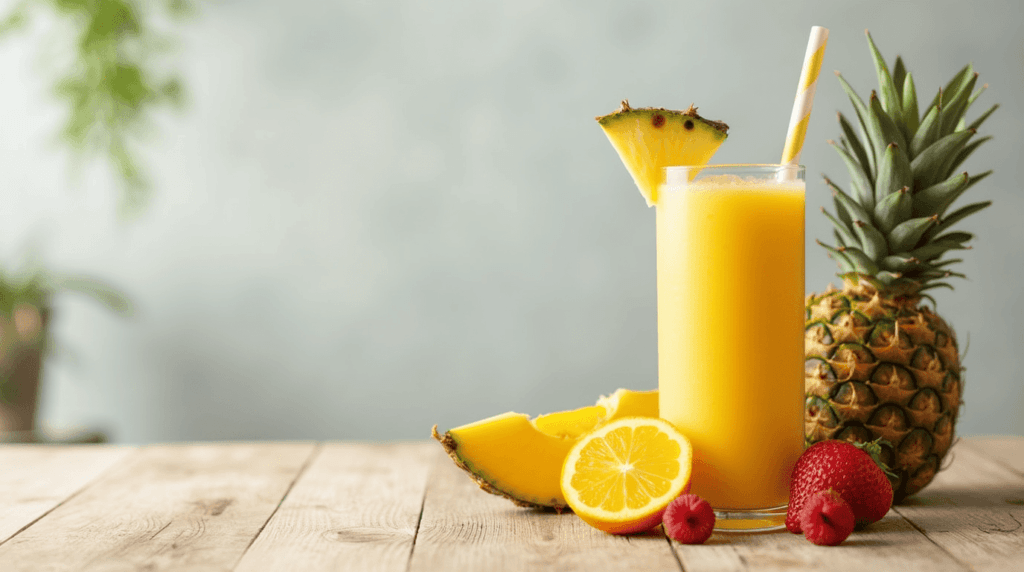
- 1 cup mango (fresh or frozen)
- 1/2 cup pineapple (fresh or frozen)
- 1/4 cup coconut milk
- 1/4 cup water
- 1/2 teaspoon ground ginger (optional)
Instructions:
Combine all ingredients in a blender and blend until smooth.
4- Chocolate Dream Gluten Free smoothie:
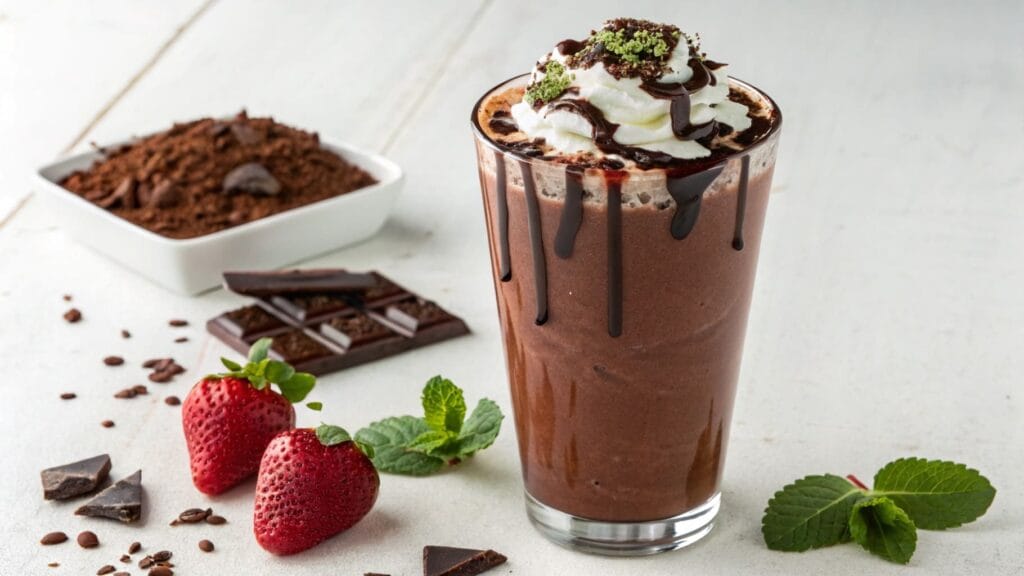
- 1/2 cup frozen banana
- 1/4 cup cocoa powder
- 1/4 cup milk
- 1/4 cup frozen berries
- 1 tablespoon peanut butter (optional)
Instructions:
Combine all ingredients in a blender and blend until smooth.
5. Blueberry Banana Spinach Smoothie(detailed)
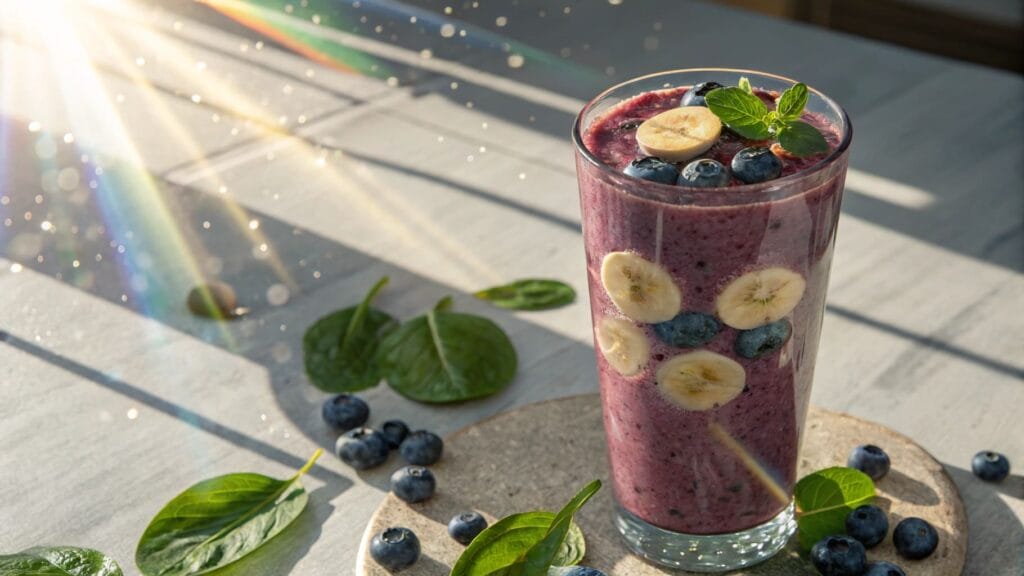
This smoothie is a nutritional powerhouse, combining the sweetness of blueberries and bananas with the mild, earthy flavor of spinach. It’s a delicious and convenient way to get a healthy dose of fruits, vegetables, vitamins, and antioxidants. The vibrant purple color makes it visually appealing as well.
Recipe Overview
| Category | Details |
| Yield | 2 servings |
| Preparation Time | 5 minutes |
| Blending Time | 1-2 minutes |
| Total Time | 6-7 minutes |
| Portion Size | ~16 oz (depending on the amount of liquid) |
| Skill Level | Beginner |
Ingredients
- 1 cup frozen blueberries
- 1 ripe banana, peeled (fresh or frozen)
- 2 cups fresh spinach, packed
- 1/2 cup milk (dairy or non-dairy – almond, soy, or coconut milk work well)
- 1/2 cup yogurt (Greek or regular, plain or vanilla) – can use a dairy-free alternative
- 1/4 cup water (or more, to adjust consistency)
- 1 tablespoon chia seeds (optional, for added fiber and omega-3s)
- 1/2 teaspoon vanilla extract (optional, for flavor)
- Honey or maple syrup to taste (optional)
Equipment
- High-speed blender
- Measuring cups and spoons
- Glasses for serving
Instructions
Step 1: Layer the Ingredients
- In a high-speed blender, layer the ingredients in the following order: milk, water, yogurt, spinach, banana, blueberries, chia seeds (if using), and vanilla extract (if using).
Step 2: Blend
- Start the blender on low speed and gradually increase to high.
- Blend for 1-2 minutes, or until the smoothie is completely smooth and creamy. You may need to stop the blender and use a tamper to push down the ingredients, especially if using a lot of frozen fruit or a less powerful blender.
Step 3: Adjust and Serve
- Taste the smoothie. Add more liquid if you prefer a thinner consistency, or a bit of honey or maple syrup if you want it sweeter. Blend again briefly to incorporate.
- Pour into glasses and serve immediately.
Chef’s Tips
- Frozen Fruit: Using frozen blueberries helps to create a thicker and colder smoothie without needing ice. If using a fresh banana, you may want to add a few ice cubes.
- Spinach Flavor: Spinach has a very mild flavor that is easily masked by the other ingredients. You can adjust the amount of spinach to your preference.
- Liquid Options: Feel free to experiment with different types of milk or even use juice instead of water for a different flavor profile. Coconut water also works well in this smoothie.
- Protein Boost: Add a scoop of protein powder (vanilla or unflavored) to make this smoothie more filling and a complete meal replacement.
- Make it Ahead: You can prepare individual smoothie packs by combining all the ingredients (except the liquid) in freezer-safe bags. When ready to make your smoothie, simply empty the contents of a bag into your blender, add your liquid of choice, and blend.
Nutritional Information
| Nutrient | Per Serving (Approximate) | Cautionary Ingredients | Dietary Restrictions |
| Calories | 220-280 kcal | Dairy (if using dairy milk/yogurt) | Dairy-Free (Use non-dairy alternatives) |
| Protein | 8-12 g | Dairy (if using dairy milk/yogurt) | Vegan (Use non-dairy alternatives) |
| Carbohydrates | 40-50 g | ||
| Fat | 3-6 g | Dairy (if using dairy milk/yogurt) | |
| Saturated Fat | 1-2 g | Dairy (if using dairy milk/yogurt) | |
| Fiber | 6-8 g | ||
| Sugar | 25-35 g | Natural Sugars from Fruit | Low Sugar (Use less fruit) |
| Vitamin A | High | ||
| Vitamin C | High | ||
| Vitamin K | Very High | ||
| Folate | High | ||
| Potassium | High | ||
| Manganese | High |
Note: These values are estimates and can vary based on the specific ingredients used and their quantities.
Tips for Creating Your Smoothies:
- Experiment with different flavors and ingredients.
- Use frozen fruit to make your smoothies thicker and creamier.
- Add a scoop of protein powder to boost the protein content of your smoothie.
- Use a high-powered blender to ensure your smoothies are smooth and creamy.
- Store your smoothies in the refrigerator for up to 2 days.
- Add a few ice cubes to your smoothies for a refreshing treat.
Beyond the Basics:
- Add a pinch of cinnamon for extra flavor and warmth.
- Top your smoothies with fresh fruit, granola, or nuts.
- Make smoothie bowls by pouring your smoothie into a bowl and topping it with your favorite toppings.
Conclusion:
More than just a fleeting health trend, nutrient dense smoothies offer a truly delicious and powerfully nutritious way to kickstart your day and nourish your body from the inside out. With an endless array of ingredients and flavor combinations at your fingertips, you can easily create these healthy drinks tailored to your individual taste preferences and health goals. Start experimenting, get creative in your kitchen, and unlock the incredible health benefits they can bring to your life!
Frequently Asked Questions About Nutrient-Dense Smoothies
Want to boost your health with smoothies? You’re in the right place! We’ve compiled answers to common questions about creating nutrient-packed smoothies that are both delicious and good for you.
Q: What can you add to a nutrient-dense smoothie?
A: Transform your smoothie into a nutritional powerhouse by adding a variety of nutrient-dense ingredients! Think beyond just fruit and consider these additions:
- Leafy Greens: Spinach, romaine lettuce, and kale are packed with minerals, vitamins, and antioxidants. Don’t worry, you often won’t even taste them when blended with other flavors!
- Healthy Fats: Avocado, chia seeds, flax seeds, and nut butters (like almond or peanut butter) add healthy fats, which are crucial for brain health, hormone balance, and satiety.
- Protein Boosters: Greek yogurt, protein powder (whey, plant-based), and even silken tofu can increase the protein content, helping you feel fuller for longer and supporting muscle health.
- Fiber Powerhouses: Oats (rolled or steel-cut), psyllium husk, and berries (especially with seeds) are excellent sources of fiber, promoting digestive health and regulating blood sugar.
- Superfood Boosts: Consider adding ingredients like spirulina, maca powder, or cacao nibs for an extra dose of vitamins, minerals, and antioxidants.
- Vegetables Beyond Greens: Don’t limit yourself! Add cooked and cooled beets, carrots, or even cauliflower for hidden veggies and added nutrients.
Q: Can I get all my nutrients from a smoothie?
A: While nutrient-dense smoothies are incredibly healthy and can contribute significantly to your daily nutrient intake, it’s not advisable to rely solely on smoothies for all your nutrients. The balanced diet is the key for optimal health.
Here’s why:
- Variety is Crucial: Different foods offer different combinations of vitamins, minerals, and phytonutrients. Relying only on smoothies might limit your exposure to this diverse range.
- Chewing and Digestion: The act of chewing starts the digestive process and can impact satiety signals. While smoothies are easily digestible, a diet only of liquids might not be as satisfying long-term.
- Other Food Groups: While you can pack a lot into a smoothie, you might miss out on the benefits of whole grains, legumes, and other food groups best enjoyed in their whole form.
Smoothies are fantastic supplements to a balanced diet, not a replacement for all whole foods. Enjoy them as a nutrient-rich meal or snack alongside a varied and healthy eating pattern.
Q: What fruit is nutrient-dense?
A: Many fruits are nutrient-dense, offering vitamins, minerals, fiber, and antioxidants. Some standouts known for their exceptional nutrient profiles include:
- Berries: Blueberries, raspberries, strawberries, and blackberries are packed with antioxidants, vitamins (especially Vitamin C), and fiber. They are relatively low in sugar compared to some other fruits.
- Avocado: Technically a fruit, avocado is incredibly nutrient-dense, rich in healthy monounsaturated fats, fiber, potassium, and Vitamin K.
- Kiwi: A small but mighty fruit, kiwi is loaded with Vitamin C, Vitamin K, Vitamin E, potassium, and fiber.
- Pomegranate: Pomegranate seeds (arils) are bursting with antioxidants, Vitamin C, and Vitamin K.
- Cherries: Rich in antioxidants and vitamins, cherries also have anti-inflammatory properties.
Remember, variety is best! Include a range of fruits in your diet for a broader spectrum of nutrients.
Q: What is an example of a nutrient-dense food drink?
A: A well-made green smoothie is a prime example of a nutrient-dense food drink. Here’s a simple example:
- 1 cup spinach
- 1/2 cup frozen berries (like raspberries or blueberries)
- 1/2 banana (for sweetness and potassium)
- 1 tablespoon chia seeds (for healthy fats and fiber)
- 1 scoop protein powder (optional, for protein boost)
- 1 cup unsweetened almond milk or water
This smoothie is packed with vitamins from the spinach and berries, healthy fats from chia seeds, potassium from banana, and protein (if added). It’s a quick and easy way to get a concentrated dose of nutrients.
Q: What is the healthiest thing to put in a smoothie?
A: While there isn’t one single “healthiest” thing, leafy green vegetables are arguably the most nutrient-dense addition you can make to a smoothie.
Why leafy greens are so powerful:
- Vitamin & Mineral Powerhouse: They are incredibly rich in vitamins A, C, K, folate, iron, and calcium, among others.
- Antioxidant Rich: Packed with antioxidants that fight free radicals and protect your cells.
- Low in Calories, High in Fiber: They add bulk and nutrients without significantly increasing calories or sugar.
Don’t be afraid to load up on spinach, kale, romaine, or other greens in your smoothies! You can often add a large amount without drastically altering the taste, especially when blended with fruits and other flavors.
Q: What are the most nutrient-dense foods?
A: Beyond just smoothie ingredients, the most nutrient-dense foods overall are often considered to be those that provide a high amount of nutrients per calorie. This includes a wide variety of whole, unprocessed foods:
- Leafy Green Vegetables: (As mentioned above – spinach, kale, collard greens, etc.)
- Organ Meats: (Liver, heart, kidney – incredibly rich in vitamins and minerals, though not for everyone’s taste!)
- Seafood: Especially fatty fish like salmon, sardines, and mackerel (rich in omega-3 fatty acids and Vitamin D).
- Berries: (Blueberries, raspberries, strawberries, etc. – antioxidant and vitamin powerhouses).
- Cruciferous Vegetables: (Broccoli, cauliflower, Brussels sprouts, cabbage – packed with vitamins, fiber, and phytochemicals).
- Eggs: A complete protein source and rich in choline and other nutrients.
- Legumes: (Lentils, beans, chickpeas – excellent source of fiber, protein, and minerals).
- Nuts and Seeds: (Almonds, walnuts, chia seeds, flax seeds – healthy fats, fiber, and minerals).
Focus on incorporating a wide variety of these nutrient-dense whole foods into your overall diet for optimal health.
Q: What not to put in healthy smoothies?
A: To keep your smoothies truly healthy and nutrient-dense, it’s best to avoid or limit these less desirable additions:
- Added Sugars: Avoid adding refined sugars, syrups (like corn syrup or agave), fruit juice concentrates, or excessive amounts of high-sugar fruits. These can spike blood sugar and negate the health benefits.
- Excessive Fruit: While fruit is healthy, too much can lead to a sugar overload. Balance fruit with more vegetables, greens, and healthy fats.
- Artificial Sweeteners: While calorie-free, artificial sweeteners may have other potential health concerns and can perpetuate a sweet tooth.
- Processed Flavored Yogurts: Opt for plain Greek yogurt instead of flavored yogurts, which are often loaded with added sugars.
- Too Much Fruit Juice (as a base): Fruit juice is stripped of fiber and can be high in sugar. Use water, unsweetened nut milk, or even herbal tea as a healthier base.
- Unnecessary Add-ins: Be mindful of trendy “add-ins” that may be expensive or not truly nutrient-dense. Focus on whole, minimally processed ingredients.
Q: What is the healthiest fruit?
A: It’s tricky to declare one fruit as the absolute “healthiest,” as different fruits excel in different areas of nutrition. However, berries often top the list when it comes to overall nutrient density and antioxidant power.
Berries like blueberries, raspberries, strawberries, and blackberries are consistently praised for:
- High Antioxidant Content: They are packed with anthocyanins and other antioxidants that combat oxidative stress.
- Vitamin Rich: Excellent sources of Vitamin C and other vitamins.
- Fiber Content: Good source of fiber, promoting digestive health.
- Relatively Lower Sugar: Compared to some other fruits, berries are often lower in sugar.
Ultimately, the “healthiest” fruit is the one you enjoy and consistently include in your diet! Don’t get fixated on just one type; embrace variety and enjoy a rainbow of fruits.
Q: Does blending fruit destroy nutrients?
A: No, blending fruit does not significantly destroy nutrients. This is a common misconception!
Here’s the truth:
- Nutrients Largely Preserved: The vitamins, minerals, fiber, and antioxidants in fruit are generally quite resilient to the blending process.
- Some Vitamin C Loss (Minimal): There might be a very slight loss of Vitamin C due to oxidation when fruit is cut and blended, especially if the smoothie sits for a long time. However, this loss is usually minimal and still leaves you with a highly nutritious drink.
- Fiber Remains: Blending breaks down the cell walls of fruits and vegetables, making the nutrients more bioavailable (easier for your body to absorb). The fiber is still there, just in a more finely processed form.
The benefits of blending fruits and vegetables into smoothies far outweigh any negligible nutrient loss. Smoothies are a fantastic way to consume more produce and boost your nutrient intake!
Disclaimer: This FAQ is for informational purposes only and does not constitute medical advice. For the best diet advice for you, speak with a healthcare professional or registered dietitian.
Loved making this? Share your experience in a review!
There are no reviews yet. Be the first one to write one.

